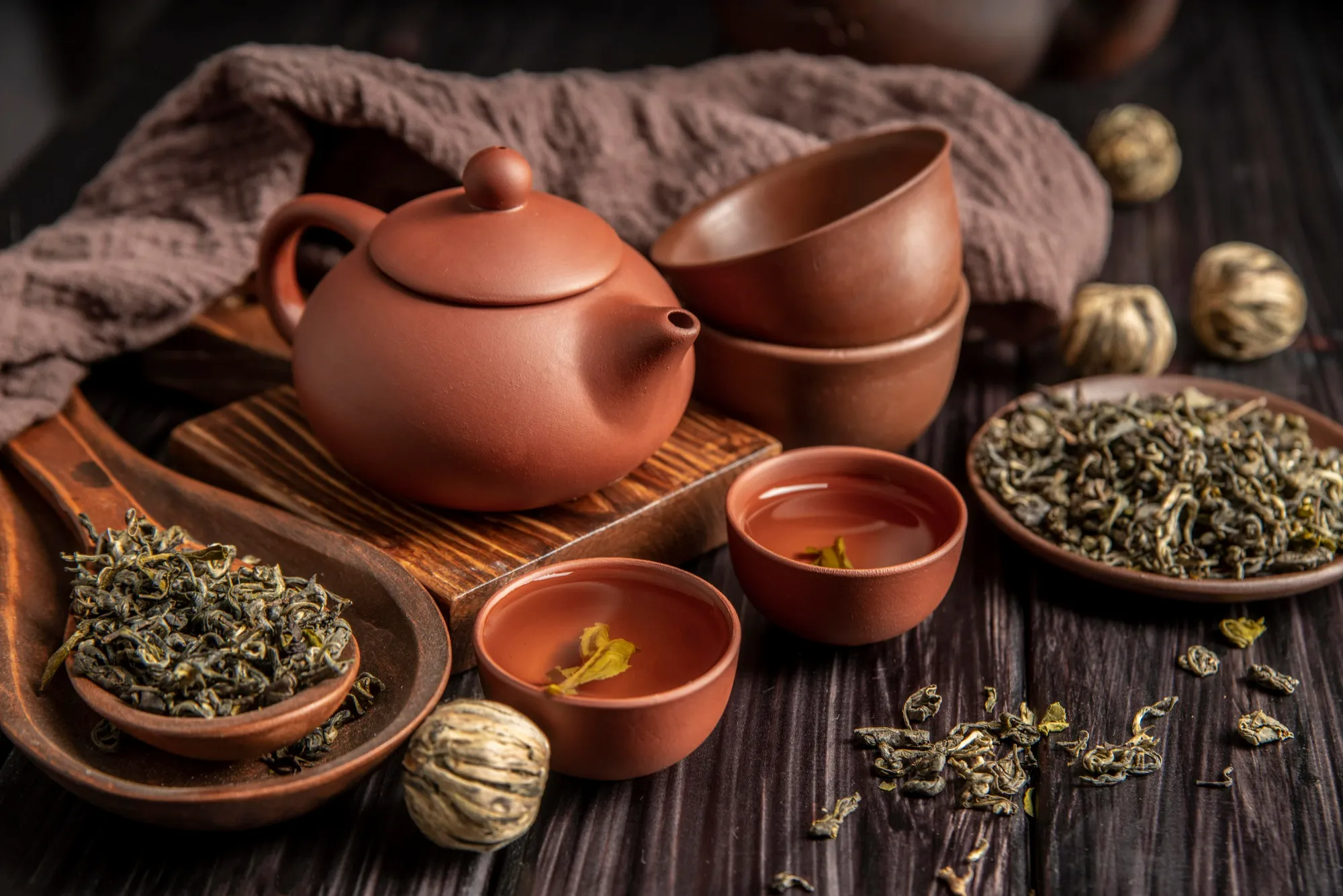Are you tired of trying every fad diet and exercise routine to see minimal results? If so, it’s time to try something new. Ballerina Tea has recently gained popularity as an effective way to lose weight and detoxify your body.
This magical tea is sometimes referred to as a “diet tea.” It’s important to note that achieving healthy and sustainable weight management requires a comprehensive approach that includes changes to your diet, exercise habits, physical activity, and lifestyle.
Let’s delve into the realm of this miraculous tea, including how it works, its history, nutritional value, ingredients, benefits, side effects, reviews, how to make it, and how it can fit into the Diet.
What is Ballerina Tea, and How Does It Work?
Malva verticellata and senna, along with other natural ingredients, combined to create Ballerina Tea, a type of Chinese Slim Tea. It is believed to work by flushing out toxins from the body and promoting weight loss. Regular drinking can help speed up your metabolism, reduce bloating, and increase energy levels.
History of Ballerina Tea
Traditional Chinese medicine has used Ballerina Tea for centuries as a natural remedy for constipation and digestive issues. In fact, its origins trace back to the early 20th century in Europe, where ballet dancers first used it to help maintain a slim physique. Marketers also promote it as a weight loss aid.
Additionally, Tea’s popularity grew in the 1960s, becoming a common remedy for bloating and constipation. Today, this magical tea is widely available and used by people worldwide for its purported weight loss benefits. Ballerina Tea has different variations, i.e., 3 Ballerina Tea, Chinese Slim Tea, and Green Ballerina Tea.
Benefits of Ballerina Tea in Weight Loss and Detoxification
This is an herbal detox Chinese tea that typically contains two key ingredients: Senna leaves and Chinese mallow.
Senna leaves
Studies have confirmed that tea made from senna leaf is beneficial for weight loss. There are three important steps in weight loss using senna leaf tea. Firstly, it prevents occasional constipation, which often results from low-fiber diets. Secondly, it enhances body fluid intake because senna provides a low-calorie, flavorful solution. Drinking it regularly can lead to reduced food intake. Thirdly, it helps to remove toxins and undigested food from the body.
In addition to their laxative effects, people believe Senna leaves have anti-inflammatory, antioxidant, and antimicrobial properties. Some studies have suggested that Senna leaves may help lower blood sugar levels and reduce the risk of certain types of cancer.
Chinese mallow
Traditional Chinese medicine has used Chinese mallow, or Malva verticillata, for centuries. It is known for its many health benefits, including:
- Digestive Health: Chinese mallow is rich in fiber, which makes it an excellent natural laxative. It can help relieve constipation and improve digestive health.
- Anti-inflammatory Properties: Chinese mallow contains anti-inflammatory compounds, effectively reducing inflammation and pain.
- Antioxidant Properties: Chinese mallow is rich in antioxidants, which help protect the body from damage caused by free radicals.
- Immune Boosting: The plant contains compounds that help boost the immune system, effectively preventing and treating infections and diseases.
- Heart Health: Studies have shown that Chinese mallow has cholesterol-lowering effects, making it beneficial for heart health.
- Skin Health: Traditional Chinese medicine has used the plant to treat various skin conditions, including eczema and psoriasis.
Chinese mallow, a nutrient-rich plant, offers numerous health benefits. However, consulting with a healthcare provider is crucial before using it as a supplement or for medicinal purposes.
In contrast, Ballerina Tea is very low in calories and contains no fat, protein, or carbohydrates. While this tea effectively draws water into the intestines, potentially promoting bowel movements and aiding in digestive processes, it’s important to note that the tea may cause dehydration and electrolyte imbalances due to its diuretic and laxative effects. Therefore, it is not recommended for long-term use and should be consumed in moderation.
Potential Side Effects and Precautions of Ballerina Tea
Pregnant and Breastfeeding Women:
This “magical” herbal tea, however, contains senna, a natural laxative. Health professionals generally discourage the use of laxatives during pregnancy because it can lead to dehydration and electrolyte imbalances. These complications can be harmful to both the mother and the fetus. Additionally, the active compounds in senna can pass through breast milk, potentially affecting the infant.
Individuals with Gastrointestinal Health Conditions:
People suffering from conditions like inflammatory bowel disease, Crohn’s disease, ulcerative colitis, and severe hemorrhoids should avoid this tea. The laxative effect of senna can aggravate these conditions, leading to increased discomfort and potential complications.
Those with Kidney or Liver Disorders:
The compounds in Ballerina tea, especially when consumed excessively, can tax the kidneys and liver. Individuals with pre-existing kidney or liver conditions should avoid the tea to prevent exacerbating their health issues.
People Taking Certain Medications:
This tea can interact with various medications. For example, it can affect the absorption of medicines due to its laxative effect, potentially reducing the efficacy of oral drugs. It may also interact with diuretics, blood thinners, and heart medications. Therefore, any medication should consult a healthcare provider before consuming the tea.
Those with Electrolyte Imbalances or Dehydration:
Since Ballerina tea can have a diuretic and laxative effect, it can lead to dehydration and electrolyte imbalances. People dealing with these issues should avoid tea, which can worsen their condition.
Children and Adolescents:
Young individuals, especially those under 18, should generally avoid laxative-containing products unless prescribed by a healthcare professional. Their bodies are still developing, and using laxatives can interfere with their natural digestive function and nutrient absorption.
Individuals with a History of Eating Disorders:
As this herbal tea is sometimes used for rapid weight loss, it might be tempting for individuals with a history of eating disorders to misuse it. This can lead to dangerous health consequences and potentially trigger disordered eating behaviors.
How to Prepare Ballerina Tea
Readymade Ballerina Tea Recipe
To make Ballerina Tea, steep a tea bag in hot water for 3-5 minutes. Drink the tea once or twice a day for the best results. Remember to drink plenty of water to prevent dehydration.
Alternative Ballerina Tea Recipe

This weight loss Tea typically contains Senna leaves and Chinese Mallow, which are not commonly found in most home kitchens. However, you can make a natural version of this tea using alternative ingredients. Here is a recipe for making this rapid weight loss tea:
Ingredients:
- 1 teaspoon of dried peppermint leaves
- 1 teaspoon of dried dandelion leaves
- 1 teaspoon of dried hibiscus flowers
- 1 teaspoon of dried ginger root
- 8 oz (240 ml) of water
Instructions:
- Bring the water to a boil in a kettle or on the stove.
- Place the dried peppermint, dandelion, hibiscus, and ginger root in a tea infuser or bag.
- Place the tea infuser or tea bag in a cup.
- Pour the boiling water over the tea infuser or bag, filling the cup.
- Allow the tea to steep for 5-7 minutes.
- Remove the tea infuser or tea bag from the cup.
- Optionally, you can add honey or lemon to taste.
Note: This recipe contains natural diuretic and laxative ingredients and should be consumed in moderation. It is also essential to consult with a healthcare professional before drinking herbal teas, especially if you have any medical conditions or are taking any medications.
Frequently Ask Questions
Q1: How long does it take for Ballerina tea to work?
The time it takes to work can vary depending on the individual’s digestive system. You can generally feel the laxative effects of the tea, due to senna, within 6 to 12 hours after consumption. However, some may experience effects sooner or later than this timeframe.
Q2: Does Ballerina tea cause cancer?
There is no direct evidence to suggest that Ballerina tea causes cancer. However, long-term use of senna, a key ingredient in the tea, can cause changes in the colon that could potentially increase cancer risk if used excessively over many years. It’s always best to use Ballerina tea in moderation and consult a healthcare provider for personalized advice.
Q3: Can I drink Ballerina tea every day?
While some may consume the tea daily for short periods, experts generally do not recommend long-term daily use due to the risk of dependency and potential side effects such as dehydration and electrolyte imbalance. It is best used occasionally for short-term relief. Ballerina tea contains:
- Cassia angustifolia.
- A herb known for its laxative properties.
- Contributing to the tea’s digestive effects.
Q4: Do I follow a specific diet or exercise routine while drinking Ballerina tea?
No specific diet or exercise routine is required, but maintaining a balanced diet and regular exercise can enhance overall health and improve the tea’s effectiveness. Always consider your nutritional needs, especially when using a product that has a laxative effect.
Conclusion
In conclusion, while Ballerina tea may be an emerging trend for weight loss, it is essential to remember that no magic pill or drink can substitute for a healthy diet and regular exercise. While the tea may have some potential benefits, such as reducing bloating and aiding digestion, it is crucial to be mindful of the possible side effects and always consult a healthcare professional before incorporating any new supplement into your routine. Remember that sustainable weight loss comes from making lifestyle changes, and a cup of tea can only do so much.
Share this content:




